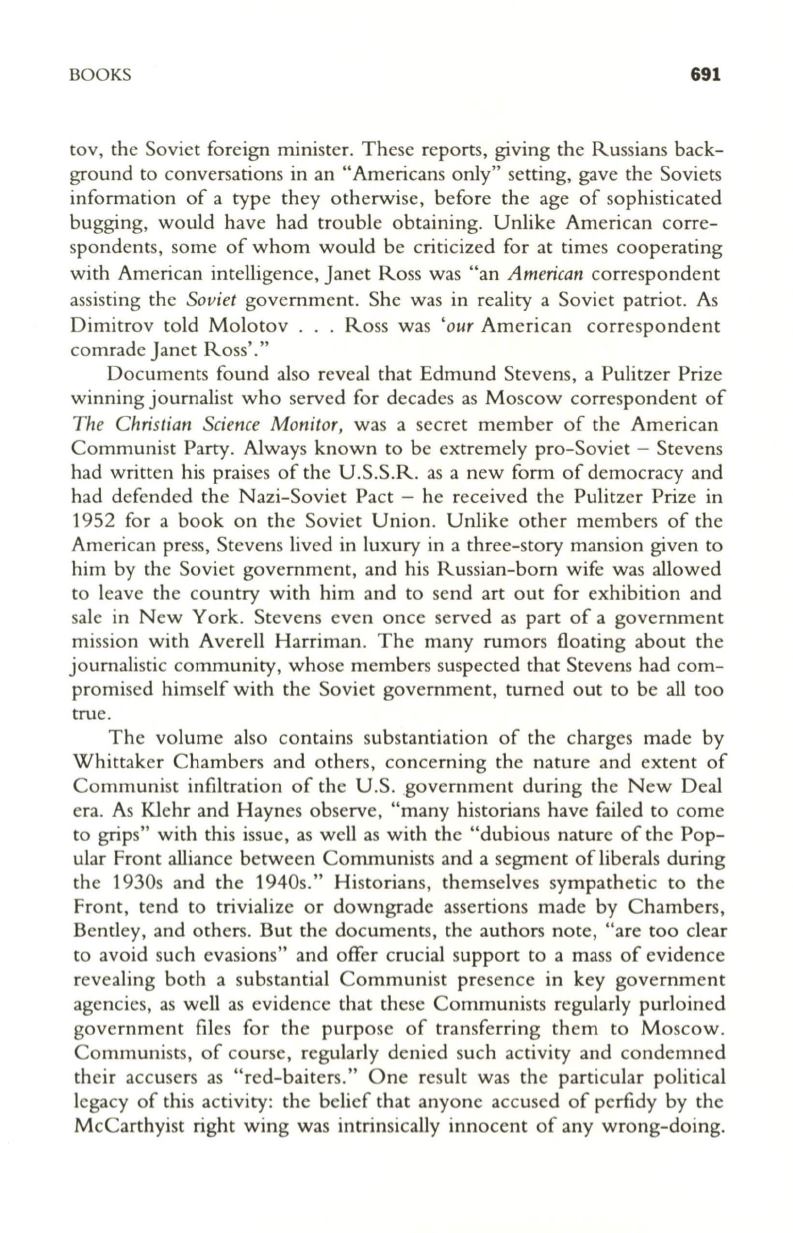
BOOKS
691
tov, the Soviet foreign minister. These reports, giving the Russians back–
ground to conversations in an "Americans only" setting, gave the Soviets
information of a type they otherwise, before the age of sophisticated
bugging, would have had trouble obtaining. Unlike American corre–
spondents, some of whom would be criticized for at times cooperating
with American intelligence, Janet Ross was "an
American
correspondent
assisting the
Soviet
government. She was in reality a Soviet patriot. As
Dimitrov told Molotov ... Ross was
'our
American correspondent
comrade Janet Ross'."
Documents found also reveal that Edmund Stevens, a Pulitzer Prize
winning journalist who served for decades as Moscow correspondent of
The Christian Science Monitor,
was a secret member of the American
Communist Party. Always known to be extremely pro-Soviet - Stevens
had written his praises of the U.S.S.R. as a new fonn of democracy and
had defended the Nazi-Soviet Pact - he received the Pulitzer Prize in
1952 for a book on the Soviet Union. Unlike other members of the
American press, Stevens lived in luxury in a three-story mansion given to
him by the Soviet government, and his Russian-born wife was allowed
to leave the country with him and to send art out for exhibition and
sale in New York. Stevens even once served as part of a government
mission with Averell Harriman. The many rumors floating about the
journalistic community, whose members suspected that Stevens had com–
promised himself with the Soviet government, turned out to be all too
true.
The volume also contains substantiation of the charges made by
Whittaker Chambers and others, concerning the nature and extent of
Communist infiltration of the U.S. .government during the New Deal
era. As Klehr and Haynes observe, "many historians have failed to come
to grips" with this issue, as well as with the "dubious nature of the Pop–
ular Front alliance between Communists and a segment of liberals during
the 1930s and the 1940s." Historians, themselves sympathetic to the
Front, tend to trivialize or downgrade assertions made by Chambers,
Bentley, and others. But the documents, the authors note, "are too clear
to avoid such evasions" and offer crucial support to a mass of evidence
revealing both a substantial Communist presence in key government
agencies, as well as evidence that these Communists regularly purloined
government files for the purpose of transferring them to Moscow.
Communists, of course, regularly denied such activity and condemned
their accusers as "red-baiters." One result was the particular political
legacy of this activity: the belief that anyone accused of perfidy by the
McCarthyist right wing was intrinsically innocent of any wrong-doing.


